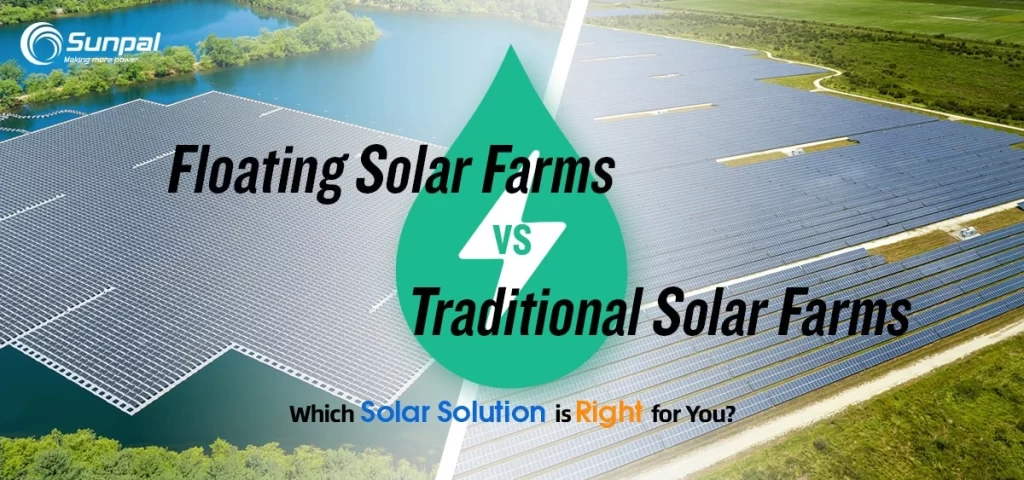
Da sich die Welt zunehmend den erneuerbaren Energien zuwendet, wird die Debatte über schwimmende Solarparks und traditionelle Solarparks ist ein heißes Thema geworden.
Angesichts zunehmender Bedenken hinsichtlich der Flächennutzung und der Umweltauswirkungen entwickeln sich schwimmende Solarparks zu einer innovativen Lösung.
In diesem Artikel gehen wir auf die wichtigsten Unterschiede zwischen schwimmenden Solarparks und herkömmlichen Solarparks ein und untersuchen ihre Vor- und Nachteile, Anwendungen und ihr Zukunftspotenzial.
Was sind schwimmende Solarfarmen?
Schwimmende SolarparksAuch bekannt als schwimmende Photovoltaik (PV)-Systeme oder Floatovoltaik, sind Solarmodule, die auf Plattformen installiert sind, die auf Gewässern wie Seen, Stauseen und Ozeanen schwimmen.
Diese Systeme nutzen die Sonnenenergie, indem sie ansonsten ungenutzte Wasserflächen nutzen.
Hauptmerkmale schwimmender Solarfarmen
- Raumeffizienz: Sie benötigen kein Land und sind daher ideal für Gebiete, in denen es an Land mangelt.
- Kühlende Wirkung: Das Wasser unter den Solarmodulen hält diese kühl, was die Effizienz erhöht.
- Reduzierte Verdunstung: Schwimmende Solarmodule können dazu beitragen, die Wasserverdunstung in Stauseen zu verringern.
Was sind traditionelle Solarfarmen?
Traditionelle Solarparks bestehen aus auf dem Boden montierten Solarzellen, die Sonnenlicht in Strom umwandeln.
Diese Systeme sind seit Jahren der Standard für die Nutzung der Sonnenenergie.
Hauptmerkmale traditioneller Solarfarmen
- Landnutzung: Sie benötigen große Mengen an Land, was zu einer Zerstörung von Lebensräumen führen kann.
- Wartung: Bodenmontierte Systeme können aufgrund von Staub- und Schmutzansammlungen mehr Wartung erfordern.
- Bewährte Technologie: Herkömmliche Solarparks haben eine lange Erfolgsgeschichte in Bezug auf Zuverlässigkeit und Leistung.
Vorteile von schwimmenden Solaranlagen im Vergleich zu herkömmlichen Solarfarmen
1. Raumausnutzung
Einer der wichtigsten Vorteile schwimmender Solaranlagen ist ihre Fähigkeit, Wasserflächen zu nutzen, ohne wertvolle Landfläche zu beanspruchen.
- Schwimmende Solaranlage: Ideal für städtische Gebiete mit begrenzter Verfügbarkeit von Land; kann an Stauseen und Seen installiert werden.
- Traditionelle Solaranlagen: Erfordert große Flächen, was in dicht besiedelten Regionen möglicherweise nicht machbar ist.
2. Erhöhte Energieproduktion
Schwimmende Solarmodule können aufgrund der kühlenden Wirkung des Wassers mehr Strom erzeugen als ihre landgestützten Pendants.
- Schwimmende Solaranlage: Studien zeigen, dass schwimmende Systeme aufgrund der niedrigeren Betriebstemperaturen bis zu 10% mehr Energie erzeugen können.
- Traditionelle Solaranlagen: Die Leistung kann bei hohen Temperaturen nachlassen, wenn sich die Paneele aufheizen.
3. Vorteile für die Umwelt
Schwimmende Solarparks können einzigartige Umweltvorteile bieten:
- Reduziertes Algenwachstum: Indem sie das Sonnenlicht davon abhalten, das Wasser zu erreichen, tragen sie dazu bei, schädliche Algenblüten zu verhindern.
- Wassereinsparung: Diese Systeme verringern die Verdunstung aus den Reservoirs und schonen so die Wasserressourcen, was besonders in dürregefährdeten Gebieten wichtig ist.
4. Geringere Auswirkungen auf den Boden
Schwimmende Solaranlagen stören die terrestrischen Ökosysteme nicht:
- Schwimmende Solaranlage: Sie lassen Flächen für die Landwirtschaft oder natürliche Lebensräume frei.
- Traditionelle Solaranlagen: Kann zur Zerstörung von Lebensräumen und zur Bodenerosion führen.
Nachteile von schwimmenden Solaranlagen im Vergleich zu herkömmlichen Solarparks
1. Anfängliche Kosten
Die schwimmende Solaranlage bietet zwar viele Vorteile, ist aber oft mit höheren Anschaffungskosten verbunden:
- Schwimmende Solaranlage: Die Installation kann aufgrund der speziellen Ausrüstung und der Verankerungssysteme teurer sein.
- Traditionelle Solaranlagen: Generell niedrigere Anfangskosten bei bewährten Installationsverfahren.
2. Herausforderungen bei der Wartung
Die Wartung von schwimmenden Solarmodulen kann komplexer sein:
- Schwimmende Solaranlage: Für den Zugang zu den Schalttafeln zu Wartungszwecken sind möglicherweise Boote oder Spezialausrüstung erforderlich.
- Traditionelle Solaranlagen: Leichterer Zugang für Wartungsaufgaben wie Reinigung und Reparaturen.
3. Umweltaspekte
Schwimmende Solarsysteme müssen aquatische Ökosysteme berücksichtigen:
- Schwimmende Solaranlage: Mögliche Auswirkungen auf die örtliche Tierwelt und die Wasserqualität müssen geprüft werden.
- Traditionelle Solaranlagen: Wirkt sich in erster Linie auf terrestrische Ökosysteme aus, hat aber eine längere Geschichte von Regelwerken.
Kostenvergleichstabelle

Anwendungen von schwimmenden Solaranlagen im Vergleich zu herkömmlichen Solarparks
Schwimmende Solaranwendungen
1. Stauseen und Seen: Ideal für die Installation auf Trinkwasserreservoirs oder Wasserkraftwerken.
2. Kläranlagen: Kann zur Abdeckung von Klärteichen verwendet werden und gleichzeitig Energie erzeugen.
3. Landwirtschaftliche Bewässerungssysteme: Schwimmende Systeme können Bewässerungspumpen direkt von nahe gelegenen Gewässern aus betreiben.
Traditionelle Solaranwendungen
1. Projekte im Maßstab der Versorgungswirtschaft: Große Freiflächenanlagen liefern eine erhebliche Energiemenge für die Netzversorgung.
2. Installationen auf dem Dach: Viele gewerbliche Gebäude nutzen Dachflächen für herkömmliche Solaranlagen.
3. Installationen auf dem Dach: Viele gewerbliche Gebäude nutzen Dachflächen für herkömmliche Solaranlagen.
Zukünftige Trends in der schwimmenden Solartechnologie
Die Zukunft der schwimmenden Solartechnik sieht rosig aus:
1. Weltweit zunehmende Akzeptanz: Da die Technologie voranschreitet und die Kosten sinken, werden wahrscheinlich immer mehr Länder schwimmende Solarlösungen einführen.
2. Hybridsysteme mit Wasserkraft: Die Kombination von schwimmenden Solaranlagen mit der bestehenden Wasserkraftinfrastruktur kann die Energieerzeugung und die Effizienz maximieren.
3. Innovative Designs und Materialien: Die laufende Forschung konzentriert sich auf die Entwicklung haltbarerer Materialien, die den Bedingungen im Wasser standhalten und gleichzeitig die Effizienz erhöhen.
Schlussfolgerung: Die Entscheidung zwischen schwimmenden Solaranlagen und herkömmlichen Solarparks
Zusammenfassend lässt sich sagen, dass die Entscheidung zwischen schwimmenden Solaranlagen und herkömmlichen Solarparks von verschiedenen Faktoren abhängt, darunter der verfügbare Platz, das Budget und Umweltaspekte.
Wenn Sie Zugang zu geeigneten Gewässern haben und die Energieproduktion maximieren möchten, ohne wertvolle Landressourcen zu verbrauchen, könnte eine schwimmende Solaranlage die ideale Lösung sein.
Wenn Sie hingegen über ausreichend Land verfügen und eine bewährte Technologie mit etablierten Praktiken bevorzugen, sind traditionelle Solarparks vielleicht die beste Wahl.
Bei Sunpal Solar sind wir spezialisiert auf Fotovoltaik (PV)-Kraftwerke in verschiedenen Formen, einschließlich konventioneller zentralisierter PV-Kraftwerke, Agrar-Voltaik, schwimmender PV-Kraftwerke und anderer Formen. Darüber hinaus bieten wir integrierte Lösungen zur Speicherung von Solarenergie an, um eine zuverlässige Stromversorgung zu gewährleisten. Wir setzen uns dafür ein, Unternehmen und Gemeinden bei der Umstellung auf saubere Energielösungen zu unterstützen, die ihren individuellen Gegebenheiten entsprechen - sei es durch innovative schwimmende Solartechnologien oder zuverlässige herkömmliche Systeme.
Wenn Sie daran interessiert sind, erneuerbare Energien effektiv zu nutzen, sollten Sie den nächsten Schritt wagen und sich für Folgendes entscheiden Solarmodule von einem Hersteller kaufen wie Sunpal Solar.
Sind Sie bereit, Ihre Möglichkeiten zu erkunden? Machen wir uns gemeinsam die Kraft der Sonne zunutze! Besuchen Sie Sunpal Solar heute!
